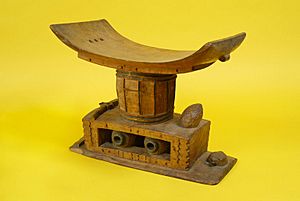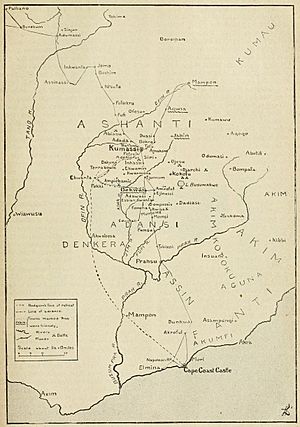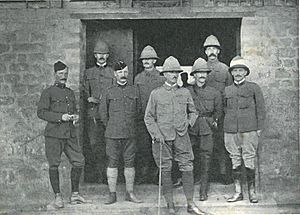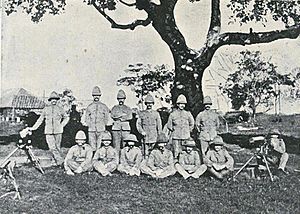War of the Golden Stool facts for kids
Quick facts for kids War of the Golden Stool or Yaa Asantewaa War |
|||||||
|---|---|---|---|---|---|---|---|
| Part of the Anglo-Ashanti Wars | |||||||
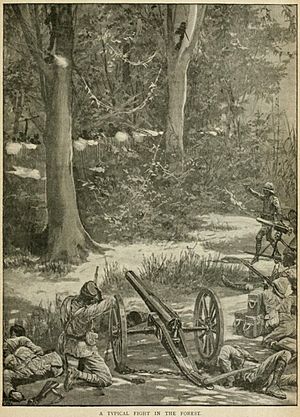 Typical fight in the forest, Anglo-Ashanti War of 1900 (Battles of the nineteenth century, 1901) |
|||||||
|
|||||||
| Belligerents | |||||||
| Commanders and leaders | |||||||
| Frederick Mitchell Hodgson James Willcocks |
Yaa Asantewaa Prempeh I |
||||||
| Casualties and losses | |||||||
| 1,007 casualties | 2,000 casualties | ||||||
The War of the Golden Stool, also known as the Yaa Asantewaa War, was a major conflict in 1900. It was part of a series of battles between the United Kingdom and the Ashanti Empire. The Ashanti were a powerful independent state in West Africa, located in what is now Ghana. They often had tense relations with the British and their allied coastal tribes.
Before this war, British troops had already taken over the Ashanti capital, Kumasi, in 1896. They sent the Ashanti king, Prempeh I, and his advisors away. The British then made Ashanti a British colony. However, the Ashanti people still kept their unique way of life and social system. Years later, in 1935, the Ashanti gained some self-rule. Eventually, Ashanti became part of the new country of Ghana in 1957.
Contents
Why the Golden Stool Was So Important
The Golden Stool was not just a chair for the Ashanti people. It was a very special symbol of their power, spirit, and the soul of their entire nation. It was believed to hold the spirit of the Ashanti people.
In 1900, a British governor named Frederick Mitchell Hodgson arrived in Kumasi. He wanted to take control of the Ashanti people completely. He made a speech to the Ashanti leaders, demanding the Golden Stool. He said the British Queen was "entitled to the stool" and that he should sit on it. This demand was a huge mistake. The Ashanti people were deeply offended because the Stool was sacred and not meant for anyone to sit on.
Hodgson's demand made the Ashanti leaders furious. They immediately began preparing for war. An expert on African cultures, Edwin W. Smith, called Hodgson's speech "singularly foolish." He explained that the British did not understand how important and spiritual the Golden Stool was to the Ashanti. This misunderstanding, along with existing tensions, led to the war.
Yaa Asantewaa Rallies Her People
After Hodgson's demand, the Queen Mother of Ejisu, Yaa Asantewaa, gave a powerful speech. She encouraged the Ashanti people to fight back. She said:
Now I have seen that some of you fear to go forward to fight for our king. If it were in the brave days... chiefs would not sit down to see their king taken away without firing a shot. No foreigner could have dared to speak to a chief of the Ashanti in the way the Governor spoke to you chiefs this morning. Is it true that the bravery of the Ashanti is no more? I cannot believe it. It cannot be! I must say this, if you, the men of Ashanti, will not go forward, then we will. We, the women, will. I shall call upon my fellow women. We will fight! We will fight till the last of us falls in the battlefields.
Her words inspired many volunteers. Soon, a large Ashanti force gathered. They attacked a small British group searching for the Stool. The British managed to retreat to their offices in Kumasi. These offices were quickly turned into a small fort with strong stone walls. Inside were 18 Europeans, many colonial administrators, and 500 Nigerian soldiers with guns.
The Ashanti warriors surrounded the fort, starting a long siege. They cut telegraph wires and blocked food supplies. They also built strong barricades on all roads leading to the town. The British inside the fort faced low supplies and disease.
The British Escape and Rescue Mission
In June, a rescue party of 700 British soldiers arrived. Realizing they needed to escape, Governor Hodgson, his wife, and over a hundred Nigerian soldiers broke out of the fort on June 23. They met the rescue force and were evacuated. About 12,000 Ashanti warriors tried to stop them, but the British managed to get away. The survivors eventually reached Accra, a city on the coast, where they received medical help.
Meanwhile, a larger British rescue force of 1,000 men was on its way from Accra. This force was led by Major James Willcocks. His troops faced many challenges, including strong resistance from Ashanti allies. They had to fight through difficult terrain and constant attacks.
Relief of Kumasi Fort
In early July, Major Willcocks's force reached Bekwai. They prepared for the final attack on Kumasi. On July 14, they began their assault. Using Yoruba warriors from Nigeria, Willcocks's troops fought through several strong Ashanti defenses. They finally reached the fort on the evening of July 15. The people inside the fort were very close to giving up.
Two days later, most of Willcocks's force left Kumasi, taking the sick and wounded with them. A small group of 160 men stayed behind to guard the fort. The Ashanti warriors, surprised by the British escape, did not attack the retreating column for many miles.
Later, more British reinforcements arrived. In September, Willcocks sent out groups of soldiers to areas that had supported the uprising. His troops defeated Ashanti forces and destroyed their strongholds. One British officer, Captain Charles John Melliss, even received a special award called the Victoria Cross for his bravery during an attack.
What Happened After the War
The British officially took over Ashanti, making it part of their empire. However, the Ashanti people still largely managed their own affairs. They had successfully protected the Golden Stool from the British.
In the year after the war, the British arrested many Ashanti chiefs, including Queen Mother Yaa Asantewaa. They sent them far away to the Seychelles islands for 25 years. Many of them died there, including Yaa Asantewaa in 1921. Today, Kumasi City has memorials to this war. Ashanti and the former Gold Coast eventually became part of the country of Ghana.
The war was costly for both sides. About 1,000 British and allied soldiers died. A British politician, David Lloyd George, criticized his government for the war. He pointed out that the Golden Stool was never captured by the British. He also said that the British should have shown more respect for the Ashanti lives lost.
The Golden Stool was hidden deep in the forests during the war. The British kept looking for it until 1921. That year, some workers accidentally found it. They took the golden decorations but left the wooden part. An Ashanti court sentenced the workers to death for disrespecting the Stool. However, British officials stepped in and arranged for them to be sent away instead.
British soldiers who fought in the war were given a special award called the Ashanti Medal.
King Prempeh I Returns Home
In 1924, the Ashanti King, Prempeh I, was allowed to return home.
Thousands of people, both white and black, gathered to welcome him. They were very excited when he arrived by special train. A charming, noble-looking man in a black suit and hat waved to the cheering crowd. That was Nana Prempeh.
See also
- Ashantiland
- Ashanti people
- History of Ghana


